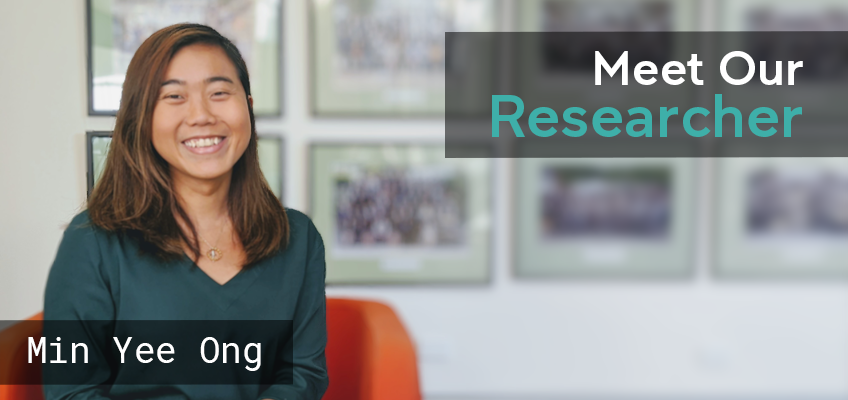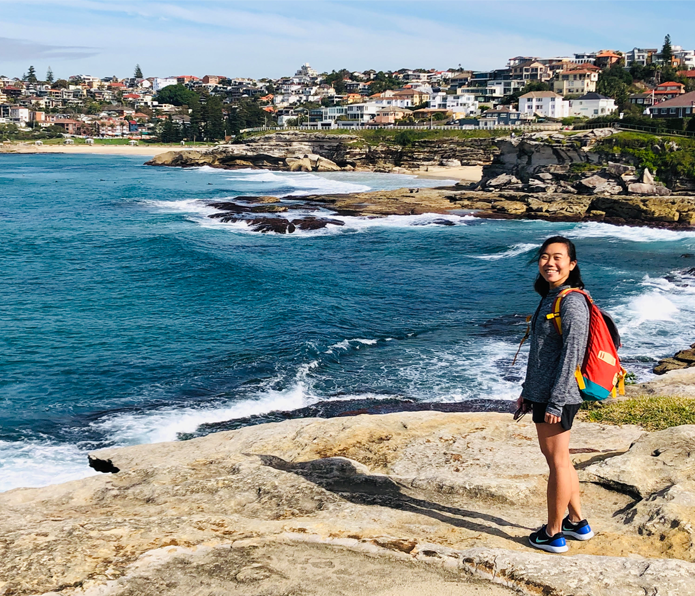06 Jun 2020

Having worked with both extremes of the lifespan, childhood and old age, Min Yee highlights we are all not really that different. Although we age, human behaviours and interactions are very similar throughout our lifetimes. Deconstructing harmful terms such as ‘worried well’ and focusing on the importance of subjective cognitive complaints in predicting decline is what motivates her strong contributions to CHeBA’s CogSCAN Study.
How did you get into researching the ageing brain?
I am originally from Singapore and studied a bachelor’s degree in psychology. Initially, I wanted to go into clinical work, but an opportunity to work in clinical research on schizophrenia at the Institute of Mental Health in Singapore drew me into research. At first, I didn’t particularly enjoy research but convinced myself to keep going and eventually not only began to enjoy it, but became quite passionate about it. I came to Australia in 2016 to complete a Clinical Neuropsychology degree and although I was happy in research, I was eager to explore more with scientific research. When I graduated in 2018, I decided to stay and do my registrar program working as a clinician at Liverpool Hospital and Developmental Paediatrics, as well as a Research Assistant at CHeBA.
Did you experience a ‘defining moment’ which led you to this field?
When I first came to Australia, I was entirely focused on paediatrics. Immediately upon graduating from University, I turned down a job opportunity in Singapore as a paediatric clinical neuropsychologist so I could remain in Australia and further my technical training. In 2017, whilst on placement during my master’s degree, I was working in aged care at Liverpool Hospital. My supervisor at the time, Ms Angela Blazely, really helped foster my interest in ageing research. This was undeniably the defining moment which anchored me to this field. For me, it was fascinating to discover that working and interacting with children and older adults was quite similar. I feel that although they are at the opposite ends of the life spectrum, they are fundamentally not that dissimilar to work with – despite the obvious difference of age. It is a real joy working with them and researching in this area.

Do you have any personal interests or activities which are protective behaviours against cognitive decline?
I am big on exercise, particularly since I began University about sixteen years ago. I run lots to help clear my headspace; it definitely assists with processing thoughts and managing the many things going on in my life. I also enjoy group sports, but this has been difficult to pursue with age and distance as the majority of my friends are in Singapore. As a result of this I have been swimming more, going to the gym and doing yoga. I enjoy hiking, walking and am considering doing a full marathon; up until now I have only completed a half marathon. I am intending on doing The Great West Walk this year; a 65km walk from Paramatta to the foot of the Blue Mountains.
What are you currently researching?
I am currently working on the CogSCAN study with Dr Nicole Kochan and her team. The study is centred around older adults’ attitudes towards using computerised tasks as a means of assessing cognitive functions in comparison to traditional neuropsychological testing. I am interested in understanding the role of subjective cognitive complaints in older adults; a phenomenon involving one’s self-experience of cognitive change or decline without impairment on objective testing. This is commonly found in older adults and is more prevalent with older age. Previously, elders with subjective cognitive complaints and no associated cognitive impairments were often referred as ‘worried wells’. However, this subjective reported change in cognition is now a core diagnostic criterion for mild cognitive impairment (MCI), which is a prodromal state of dementia. The presence of such complaints may present an increased risk for possible incident MCI and progression to dementia. My research aims to explore this phenomenon and how it measures up with objective cognitive performance.
Why is your research important?
I believe it is important both clinically and for the general population. In the clinical sense, my research will hopefully be able to inform and guide clinicians when assessing subjective cognitive complaints raised by older adults. For example, what approach clinicians can take when assessing subjective cognitive complaints, or how they can include other information such as from objective cognitive assessment to understand and track an individual’s progress. With the general population, many older adults tend to complain to their relatives and friends about their memory not being as good as it was earlier in life. What research shows is that individuals making these complaints may be at an increased risk of incident MCI and progression to dementia within a couple of years.
There is truth behind subjective cognitive complaints, rather than notions of being ‘worried well’.
Studies have also found associations between individuals reporting a higher degree of worry about their cognition with Alzheimer’s disease biomarkers such as higher amount of beta amyloid in the brain. We are listening to these complaints more and more because there is truth behind them. With that knowledge, the question we want to answer is ‘what can we do at the earliest stage’? Can we develop strategies to prevent this or slow the rate of decline with the knowledge we have?
What do you love about working at CHeBA?
That I get to interact and work directly with the older population. I am part-time at CHeBA which means I am able to split my time between research, at a paediatric clinic and at Liverpool Hospital Aged Care Unit. It is nice to work with the older population, there is a sense of engagement with them, getting to know them as a person, who they are and not just there to assess them for research purposes. They helped me learn more about what their lives are like. I really enjoy listening to their stories and giving advice on how they can best keep their brain active and healthy.
The part I enjoy most is spending my time at CHeBA doing face to face assessments for CogSCAN, and it is also a joy working with the team. We work really well together, and everyone is very supportive.
What is the ultimate hope you have for your research?
My short-term goal is for our research to be published. By reaching more Australian clinicians and practitioners we can achieve wider understanding of the relevance of subjective cognitive complaints. Although research in this area is starting to pick up, much more needs to be done. Changing the notion that subjective cognitive complaints are vague and insubstantial and helping clinicians understand the importance of them, will encourage these types of complaints to be taken seriously. There is undeniable truth behind the capacity to help older adults achieve long-term health benefits by understanding and responding to subjective cognitive complaints.
This interview was undertaken during the COVID-19 self-isolation period. Min Yee found that having weekly video calls with family and playing games via phone apps with friends supported her mental resilience and kept her feeling socially connected while physically isolated.
Donations are fundamental for critical research to continue following COVID-19.
If you would like to discuss supporting Min Yee's work specifically, or would like information
on leaving a legacy via a Gift in your Will, please contact h.douglass@unsw.edu.au.

Min Yee is a Research Assistant with CHeBA’s CogSCAN Study, General Psychologist at Developmental Paediatrics and Clinical Neuropsychologist Registrar at Liverpool Hospital in the Neuropsychology Aged Care Unit. She completed both a Bachelor of Social Sciences in Psychology and a Master of Social Sciences at the National University of Singapore. Upon graduating she worked as a Senior Research Coordinator for the Singapore Institute for Clinical Sciences, Agency for Science, Technology and Research facilitating studies exploring the neurocognitive functions of children and adolescents. Her experience in the field of neuropsychology fostered her interest in the application of research to practice, motivating her completion of a Master in Clinical Neuropsychology at Macquarie University. Min Yee has a strong interest in understanding neurogenerative illnesses and working with older populations.
